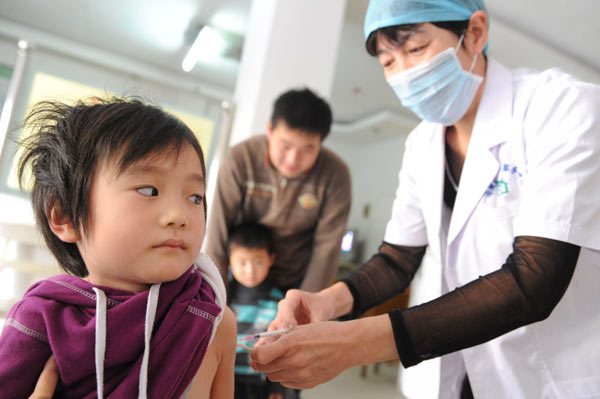Jab to give measles the KO in China
Foreigners living in China will be covered by a nationwide measles immunization campaign, which targets children mainly between 8 months and 4 years of age, the Ministry of Health said on Wednesday.
 |
|
A child receives a measles vaccine from a doctor at Bozhou, Anhui province. [Zhang Yanlin / for China Daily] |
The free 10-day vaccination program, funded by the central government, will start on Sept 11. It will benefit about 100 million minors on the mainland and is crucial to meeting the goal of eliminating measles by 2012, said Health Minister Chen Zhu.
The goal was set and recognized in 2005 by 37 member countries and regions in the WHO West Pacific Region, including China.
"The vaccination, the largest ever of its kind in the country, if not internationally, needs to cover at least 95 percent of the target population to avert potential outbreaks, though it's voluntary," said Liang Xiaofeng, director of the Chinese Center for Disease Control and Prevention's immunization center.
Despite a 99 percent reduction in reported measles cases in China since the government introduced a routine immunization program in 1978, the program still only reaches about 80 percent of the population, he said.
In 2009, more than 52,000 people in China were reported to have contracted measles, accounting for 86 percent of the total cases in the WHO West Pacific Region, and nearly 32 percent of the world's total.
"China is a priority country in the global fight against measles," said Dr Michael O'Leary, WHO's representative in China.
He urged the government to improve access to vaccinations among vulnerable and hard-to-reach groups like the huge floating population of migrant workers.
"The coming campaigns will help address those gaps to finally eliminate the disease in the country," said Hao Yang, deputy director of the Ministry of Health's disease prevention and control bureau.
Health workers will go door to door to ensure no eligible child is missed, and temporary vaccination clinics will be set up in areas with high populations of migrant workers, he noted.
"It needs the cooperation of the parents," he said.
Hao conceded that there may be potential resistance among the population to immunization because of misplaced fears about vaccine safety after the vaccine scandal in Shanxi province.
All vaccines to be used in the campaign are domestically made, said Liang.
Despite potential side effects - mainly minor and temporary - the vaccine, which has been used to prevent measles since the 1960s in China, has proven to be safe and effective, he added.
 0
0 






